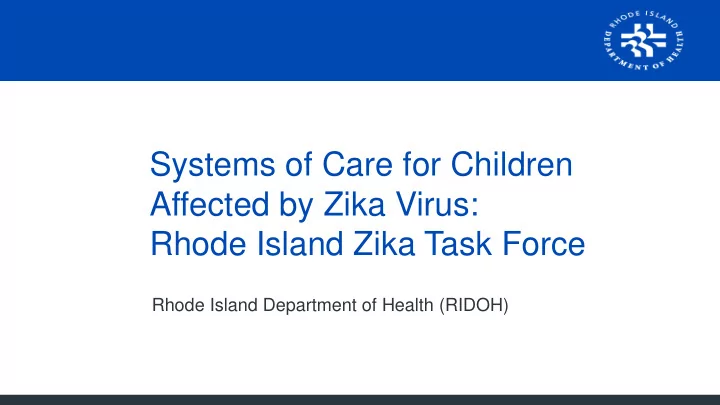

Systems of Care for Children Affected by Zika Virus: Rhode Island Zika Task Force Rhode Island Department of Health (RIDOH)
RI Zika Task Force • Convened by the RIDOH in February 2016 • Goal: coordinated communications and approach to the identification, treatment, and follow up of babies affected by Zika virus • Weekly meetings, then biweekly, now monthly • Meeting participants: RIDOH, DEM, Clinical colleagues: prenatal care, birth hospitals, neonatology • Infectious Disease and Epidemiology • Emergency Preparedness and Response • State Health Lab • Communications • Maternal Child Health Programs • Refugee Health Program • Center for Health Data and Analysis • Climate Change Program
Zika Surveillance in RI Birth Hospitals: 5 Births Per Year: 10,000-12,000
Zika Surveillance in RI Zika Virus Cases to Date: Non-Congenital: 55 Congenital: 1 Zika Testing Category Number of tests Positive Negative Pending Pregnant Female Asymptomatic 563 19 501 62 Symptomatic 58 12 44 2 Infant 47 1 40 6 Male Zika Case with 5 0 5 Pregnant female partner Other symptomatic 136 43 93 individuals
Zika Surveillance in RI Family Visiting Program
Zika Case Tracking Initial testing • Case Report Form • Authorization for testing request from • Family Visiting Information OB to IDE • RIDOH internal tracking spreadsheet • IDE follow up call to OB If Zika test • Family Visiting Information again positive • RIDOH internal tracking spreadsheet • Birth hospital EMR tracking-registry • IDE phone call to OB at 24 and 35 weeks During • Review instructions for post delivery sample Pregnancy collection: umbilical cord, placenta, baby labs
Zika Case Tracking • Neonatal Assessment data collection-nursery After Birth: • Infant specimen collection: 2 weeks for Birth Hospital results • Lab results: IDE phone call to PCP Follow up: • Referrals to EI, Family Visiting, NICU follow up clinic Neonatal Follow up: • IDE follow up phone calls at 2, 6, and 12 mon • NICU f/u clinic: 1-3 mon, 6-9 mon, 12 mon, First year 2, 3 ,5 years
Rhode Island and Zika • Rhode Island ’ s small size allows for: • Regular in person meetings of a statewide Zika task force • Case tracking by RIDOH with close communication with OB, birth hospitals, and pediatric medical home • Strategies possibly applicable to other states: • State specific case report form with prompts for referrals to local services • Referrals to Family Visiting programs as a component of the case tracking process • Enhanced developmental surveillance and screening (i.e. NICU follow-up clinic)
Learn the Signs. Act Early. (LTSAE) Stacey Aguiar, MPH, CHES Rhode Island’s Act Early Ambassador AMCHP Conference 2017
Mission To improve early identification of developmental delays and disabilities, including autism, by promoting parent-engaged developmental monitoring and screening so children and their families can get the early services and support they need.
Resources & Materials • Free , customizable materials • Available at www.cdc.gov/ActEarly – Research-based and parent-friendly – Build on American Academy of Pediatrics (AAP) gold standard lists – Parents and providers can use as monitoring tools – Encourage/enhance parent-provider dialogue – Available in English, Spanish and a few other languages
Resources & Materials
RI’s Integration • Organizations and Programs: – Home Visiting, Early Intervention, Special Supplemental Program for Women, Infant and Children (WIC), Youth Success, Early Head Start and primary care • Policies and Procedures: – Complete “ Watch Me! Celebrating Milestones and Sharing Concerns ” Training – Order and distribute materials (i.e. Milestone Moments Booklet)
Questions? Stacey Aguiar, MPH, CHES Ailis Clyne, MD RI ’ s Act Early Ambassador Medical Director stacey.aguiar@health.ri.gov ailis.clyne@health.ri.gov 401-222-1087 401-222-5928
Recommend
More recommend